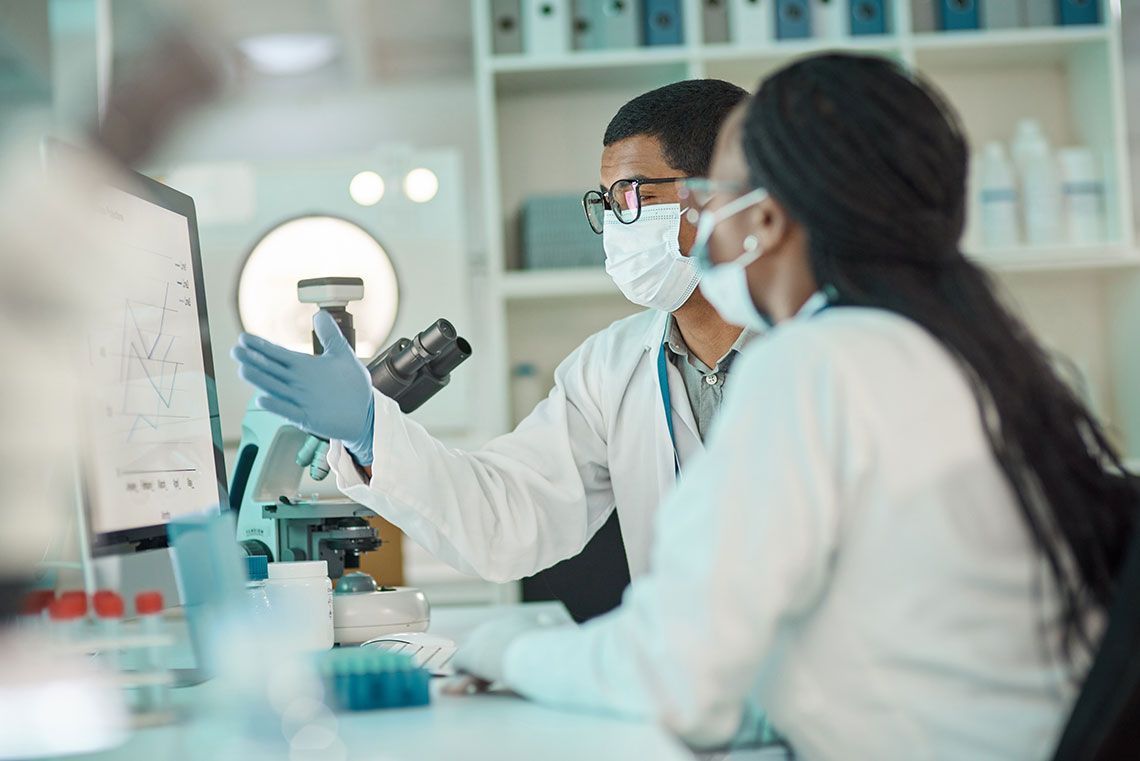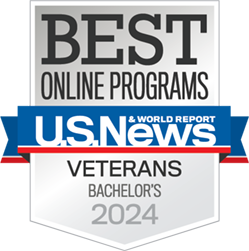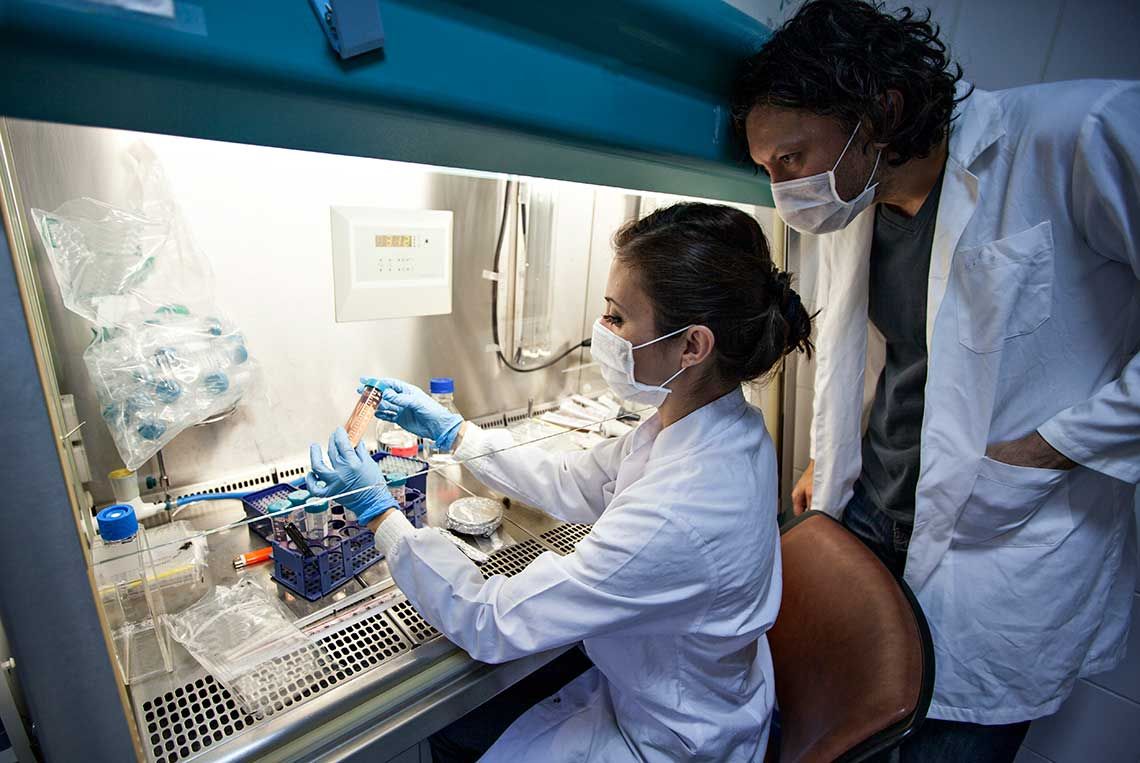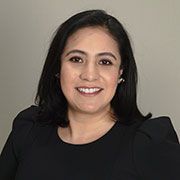
Work hands-on at the molecular level.
Online Coursework
12 Months
The George Washington University’s (GW) Post-Baccalaureate Certificate in Medical Genetics and Molecular Biology gives you the knowledge and hands-on experience to work testing DNA, RNA, proteins, and other biological products.
You will learn the specific clinical laboratory techniques to detect and identify biomarkers at the nucleic acid levels in major areas of medicine including genetic disorders, infectious diseases, cancer, pharmacogenetics, and identity testing.
Program Highlights
- ASCP (MB) Qualify for the ASCP Molecular Biology (MB) Exam
- Clinical practicum waivers are available for qualified students
- Finish in about 12 months
- Students of this program are eligible for financial aid
Program Outcomes
Upon successful completion of the program, students will be able to:
- Explain the methods of collection, transport and handling of various specimen types for molecular analysis.
- Apply molecular-based testing for laboratory utilization and clinical decisions for patient/client outcomes
- Implement preventive and corrective maintenance programs for equipment and assays, as well as troubleshoot and evaluate appropriate actions for problem resolution
- Apply knowledge of molecular and genetic theory and principles as they relate to human disease diagnosis.
Request Information
* Indicates required field
- Read: Privacy Disclaimer Acknowledgment
-
By submitting your contact information, you are providing your express consent authorizing GW and GW's representatives to contact you by email, phone, or text (including the use of an automatic dialing system). Standard text messaging and/or data rates may apply.
If you do not provide your contact information (phone and email), we may not be able to provide you with the information you requested.
If you provided your contact information but no longer wish to receive phone calls, emails, or text (SMS) messages from GW, you will have the option to opt-out. Emails and Text messages will include details for unsubscribing/opting out. To opt out of receiving phone calls from GW, contact us via email at info [at] hsprograms [dot] gwu [dot] edu (info[at]hsprograms[dot]gwu[dot]edu) or text/ call: 202-792-2819.
By submitting your information via this form, you also confirm that you have read and understood the GW Statement of Privacy Practices.
Note that the consent requested above is not required for enrollment in GW's programs. If you do not consent to providing the information requested on this form, you may contact us via email at info [at] hsprograms [dot] gwu [dot] edu (info[at]hsprograms[dot]gwu[dot]edu) or text/ call: 202-792-2819.
Accreditation and Rankings
- GW is accredited by the Middle States Commission on Higher Education
- #62 Best National University*
- #13 Best Online Bachelor's Programs*
- #7 Best Online Programs for Veterans*
* The U.S. News & World Report – 2024 Rankings



Curriculum
Launch your laboratory career with seven courses dedicated to the exciting, up-and-coming field of medical genetics and molecular biology testing.
You will focus on topics such as laboratory management and operations, molecular biology, human genetics, and applied molecular testing, and complete the certificate with a practicum diagnosing diseases in a real-world clinical setting.
Finish this program ready to help people get well through effective testing and diagnostics.
Who Is the Ideal Student for This Program?
To handle the online portion of the degree, you must be organized and independent. Students who excel at science-based coursework and are excited by molecular testing’s potential for medical science are a good fit for this program.
Career Outlook
Given the rise of commercialized, at-home DNA testing kits and recently proven medical capabilities, particularly in cancer diagnosis and treatment, the need for diagnostic molecular scientists who can ethically and properly manage the challenges of molecular testing and the data it provides is great.
When you graduate with the online Post-Baccalaureate Certificate in Medical Genetics and Molecular Biology from GW, you will be prepared to work as a technologist in a diagnostic molecular laboratory, public health laboratory, research institution, law enforcement agency, the molecular section of hospital laboratories, reference laboratory, biotechnology firm, or, pharmaceutical company.
Medical technologists with molecular biology skills earn a median salary of $55,740 per year, with the top 10% earning more than $73,000.1
Admission Requirements
To be accepted to this program, you must have:
| Completed application |
| 2.5 GPA or above on a 4.0 scale |
| Bachelor's Degree |
| Resume/CV |
| Statement of purpose: Applicants must include a 250–500 word essay describing your reasons for undertaking study at GW, your academic objectives, career goals, and related qualifications including collegiate, professional, and community activities relevant to your program of interest. Include any substantial accomplishments not already mentioned on the application form. |
| One letter of recommendation |
Tuition Details
The Post-Baccalaureate Certificate in Medical Genetics and Molecular Biology program at GW consists of 24 credit hours. Explore the cost per credit hour and total estimated program costs.
Note: Tuition rates are subject to change and additional fees may vary by program.
Meet the Program Director

GW’s experienced faculty provide you with the rich, practical knowledge and support needed for you to succeed in the program and in your career.
Graciela Lopez Gamboa, M.D., MSHS
- Read Full Bio
-
Dr. Graciela Lopez is the current program director for the Molecular Diagnostic Sciences and Medical Genetics and Molecular Biology programs. She started her career in 2006 as a physician in Bolivia, later moving to the US where she continued to work in the medical clinical setting for over 10 years. During this time she became interested both in clinical laboratory sciences as well as being part of academics, and in 2018 she graduated from the MSHS in Molecular Diagnostic Sciences program form George Washington University. The following year she began working with the Biomedical Laboratory Department (BLS) as adjunct faculty and since 2022 she has been in a fulltime faculty member. Nowadays, aside from her program director responsibilities she teaches online courses in the different programs available through our department plus she also teaches the in-person Medical Genetics and Molecular Biology lab for our hybrid students.
Dr. Lopez is passionate about healthcare education and bringing awareness to healthcare careers, especially those within the clinical laboratory setting. She has been involved in developing the Medical Laboratory Technician/Phlebotomy Assistant pathway for the Health Science Academy at Alexandria City Highschool and was the first instructor for that program. She also participated as a mentor for HOSA- Future Health Professionals.
She is currently working on completing the Master Teacher Leadership program through GW University with the goal to continue to improve the courses and programs she is involved with.
She looks forward to working on academic and lab-based research alongside her BLS colleagues, as well as with the students that come through our programs.
Sources:
- Payscale (2020 January 20). Medical Technologist with Molecular Biology Skills. Retrieved on February 19, 2020
*Since each state may have different requirements for licensure, each student is encouraged to contact their state’s regulating agency and review these requirements prior to beginning any degree program. States requiring licensure may require extended duration of practicum experiences, additional academic courses (outside the student’s program of study), etc. These additional requirements may require you to take a course or courses outside of GW. Each student is encouraged to contact their state’s regulating agency and review these requirements prior to beginning any degree program. In particular, New York and California have additional requirements for state licensure. Both NY and CA require extended times for practicum rotations.
Please also be aware that the fully online post-baccalaureate certificate programs do not meet the student lab requirement for NY state licensure. Also, for those applying to the fully online post-baccalaureate categorical certificates in hematology, microbiology, blood banking, and chemistry, the state of New York does not provide licensure for categorical certification (e.g., Technologist in Microbiology, Technologist in Blood Banking, etc.). We recommend that students who live in New York or California plan to relocate to New York or California do research to determine the NY and CA licensure requirements.
Curriculum Details
24 TOTAL CREDITS REQUIRED
Through seven courses and a total of 24 credits, this certificate prepares you to take the Molecular Biology Board of Certification exam offered by the American Society for Clinical Pathology.
You’ll gain specific laboratory techniques detecting and identifying biomarkers at the nucleic acid level in major areas of medicine including genetic disorders, infectious diseases, cancer, pharmacogenetics, and identity testing.
Coursework is 100% online and the certificate concludes with a six-credit in-person practicum in a real-world setting. Students with clinical laboratory experience may be eligible to waive individual clinical practicum requirements
Core
- MLS 4158 Laboratory Management and Operations (3)
-
Introduction to critical concepts of lab management, including leadership theory, management principles, human resource management, financial management, quality management, and laboratory operations.
- MLS 4170 Introduction to Molecular Biology (3)
-
Foundational course in molecular biology; DNA replication, DNA repair, transcription, translation and gene regulation.
- MLS 4171 Human Genetics (3)
-
An introduction to the theory of and laboratory techniques in molecular biology with an emphasis on molecular and serological techniques, including DNA extraction and quantitation, restriction enzyme digestion, polymerase chain reaction, agarose gel electrophoresis, flow cytometry, and ELISA Restricted to students in the medical laboratory science program.
- MLS 4172 Medical Genetics and Molecular Biology Capstone (3)
-
Culmination course for the BSHS in medical genetics and molecular biology sciences program. Provides an overview of medical genetics and molecular biology using a case-based approach. Students must have earned a minimum grade of C in all prerequisite courses in order to enroll in this course. Program director approval may be substituted for prerequisite courses. Proctor fee.
- MLS 4217 Molecular Techniques (3)
-
Course Description: Theory and processes of current molecular techniques used to diagnose human disease.
- MLS 4242 Applications of Molecular Testing (3)
-
This course will cover the application of molecular testing to diagnose various human diseases and disorders. Proctor fee.
- MLS 4266 Medical Genetics and Molecular Biology Practicum (6)
-
Application of molecular techniques in a clinical setting to facilitate the diagnosis of human diseases. Students must have earned a minimum grade of C in all prerequisite courses Instructor permission may be substituted for prerequisites.
Key Dates
|
Fall 2026 |
|
| Application Deadline |
July 20, 2026 (Open) |
Admissions Requirements
To apply for the Post-Baccalaureate Certificate in Medical Genetics and Molecular Biology program (online coursework), you will need:
| Completed application |
| 2.5 GPA or above on a 4.0 scale |
| Bachelor’s degree from an accredited college or university. |
| Resume/CV |
| Statement of purpose: Applicants must include a 250–500 word essay describing your reasons for undertaking study at GW, your academic objectives, career goals, and related qualifications including collegiate, professional, and community activities relevant to your program of interest. Include any substantial accomplishments not already mentioned on the application form. |
|
One letter of recommendation Letter of recommendation should be from:
Recommender will submit a letter on letterhead with a signature and credentials/contact information via the application portal. |
| Official transcripts from every college and university attended. All non-U.S. transcripts (including those in English) must be evaluated by an accredited foreign credential agency. Please find the list of member organizations here: https://www.naces.org/members. |
|
Completed coursework: All required courses must be completed with a C grade (C- grades and lower do not transfer) or better at a regionally accredited institution of higher learning:
|
| Application fee: A non-refundable application fee of $80 is required. The application fee is waived for active-duty U.S. military, current GW students, degree-holding GW alumni, current McNair Program Scholars, and graduates of minority-serving institutions (MSI). |
| At the time of admission, students who live outside of the Washington, D.C. metro area are required to secure a clinical site which satisfactorily meets the requirements for a medical genetics and molecular biology clinical rotation. |
| Review the Criminal Background Check and Drug Screening Policies in the Health Sciences Programs Bulletin |
|
Since each state may have different requirements for licensure, each student is encouraged to contact their state’s regulating agency and review these requirements prior to beginning any degree program. State’s requiring licensure may require extended duration of practicum experiences, additional academic courses (outside the student’s program of study), etc. These additional requirements may require you to take a course or courses outside of GW. In particular, New York and California have additional requirements for state licensure. Both NY and CA require extended times for practicum rotations. Please also be aware that the fully online post-baccalaureate certificate programs do not meet the student lab requirement for NY state licensure. Also, for those applying to the fully online post-baccalaureate categorical certificates in hematology, microbiology, blood banking, and chemistry, the state of New York does not provide licensure for categorical certification (e.g., Technologist in Microbiology, Technologist in Blood Banking, etc.). We recommend that students who live in New York or California or plan to relocate to New York or California do research to determine the NY and CA licensure requirements. |
NOTE: This program is authorized, exempt, or not subject to state regulatory compliance and may enroll students from all 50 states, U.S. territories and the District of Columbia.
International Students
Effective Fall 2025
International students should check with individual programs regarding eligibility for visa sponsorship. Generally, online and hybrid programs are not eligible for student visa sponsorship from GW. This would include transfer students from any other institution with an existing visa. To be considered for admission, there are required scores that you will need to meet. Score requirements may differ by school and program so check the admissions requirements for your program.
Applicants who have not completed a post-secondary degree from an institution where English is the sole language of instruction are required to submit TOEFL, IELTS, PTE Academic, or the Duolingo English Test scores to be considered for admission. The following are the minimum scores for admission consideration:
- TOEFL: 600 on paper based, 250 on computer-based, or 100 Internet-based,
- PTE: overall score of 68,
- IELTS: an overall band score of 7.0, with no individual band score below 6.0
- DET overall score of 120.
Undergraduate applicants who meet one of the following conditions may be considered for admission without submitting TOEFL, PTE or IELTS or DET scores:
- You have earned an associate’s degree or higher from an institution where English is the sole language of instruction
- You are a citizen of an English-speaking country
Scores may not be more than two years old. To ensure TOEFL scores are sent to GW, use institutional code 5246. An institutional code is not required to send IELTS or PTE scores to GW. DET scores must be submitted via the Duolingo English Test system directly to GW.
Based on the results of your English Proficiency exam results and your application, you may be required to take English for Academic Purposes (EAP) during your first year of study at GW. Please note that GW evaluates each application holistically so applicants may still be recommended for EAP even if they meet the requirements for exemption. Students placed in EAP courses should anticipate additional tuition expenses as well as possible extension of time needed to complete their degree programs.
Official transcripts from institutions outside the U.S. must be accompanied by an official transcript evaluation from an accredited independent evaluating agency. Please be sure you request a detailed evaluation that includes all course titles, credit hours, grades, U.S. degree equivalency, grade-point averages (GPA), and date of degree conferral (course by course evaluation). For a list of acceptable foreign credential evaluation services, please visit NACES.
Supporting documents not submitted online should be mailed to:
Mail: George Washington University
ATTN: Transcript Processing Center
1415 W 22nd St.
Suite 220
Oak Brook, IL 60523
Alternatively, official electronic transcripts can be sent to: transcripts [at] hsprograms [dot] gwu [dot] edu (transcripts[at]hsprograms[dot]gwu[dot]edu)